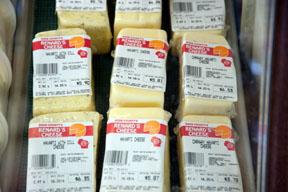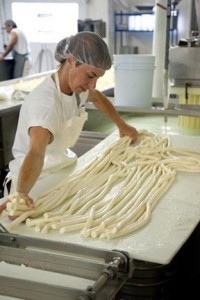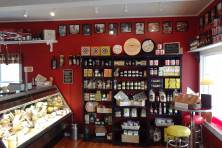Say Cheese
- Share
- Tweet
- Pin
- Share
There were once 1,300 dairy farms in Door County, according to a video at the Door County Historical Museum, and they sold their milk to 49 “crossroads” cheese factories. Today, there are fewer than 150 dairy farms left, with 27 of them supplying the lone remaining local cheese factory, Renard’s.
The museum’s video tells the story of “a life’s labor that has virtually disappeared.” George Evenson, a retired dairyman and president of the Door County Historical Society, says that dairy farming “can never go back to the way it was before,” when there were 20,000 cows on the peninsula in 1951, but just 9,000 today.
But at Renard’s, cheese is still made exactly as it was in 1961 when Howard Renard, the great-grandfather of the youngest helpers in the family business, bought Rosewood Cheese Factory, built in 1910 and rebuilt after a fire in 1933. There is no automation. Every one of the 7,000 pounds of cheese turned out six days a week is produced by hand by the factory’s nine employees.
Those who have seen American Folklore Theatre’s production of Cheeseheads: The Musical will find a very similar real-life operation at Renard’s. Like Schnabel’s Famous Cheese in the show, Renard’s has a tight-knit group of employees, including the ones who aren’t named Renard. “We’re all family,” said third-generation cheese maker Chris Renard. “If someone’s child is in a program at school, we’ll cover for them. That’s one of the reasons our people stay with us so long.” (Tom Kinjerski, the man in charge of the warehouse, has been with the company for a quarter-century.)
When Howard Renard bought Rosewood 49 years ago, renaming it Renard’s Rosewood, there were more than 25 cheese factories in Door County. The ones that are gone sold their cheese to only one customer. Renard’s originally sold to Pauly Cheese Company in Green Bay, but they soon began to market their own products, a move that Chris says enabled them to survive.
In the heyday of Door County dairying, farmers used horse-drawn wagons to haul their milk to the cheese factories in cans holding up to 30 gallons and weighing more than 200 pounds. Now, an average of 65,000 pounds of milk are delivered to Renard’s every day by Kolstad Trucking, third-generation milk haulers. The milk is refrigerated overnight. Either Chris, his uncle and partner, Brian, or cheese maker Aaron Miller arrives at 12:30 am and starts pasteurizing the milk that has to be held at 161 degrees for 15 seconds to kill all the bacteria. Next a starter bacteria culture is added, with specific bacteria for each kind of cheese produced – cheddar, Monterey jack, mozzarella, farmer cheese, Swiss and provolone. Color is added during the hour it takes to fill a 20,000-pound vat, then rennet, a coagulant, is added to turn the milk into cheese.
When the mixture is firm enough, it’s cut with a huge wire knife, then the curd and whey are separated, and it’s cooked at a specific temperature – 100 degrees for cheddar, 99 degrees for mozzarella. Next the whey is drawn off into a holding tank and the cream is separated and sold to Pine River Dairy in Manitowoc to make butter. The remaining whey is sold to Packerland Whey and processed into feed for veal calves.
Meanwhile, back at Renard’s, the curd is cut into slabs and stacked, a process called matting or cheddaring. The slabs are run through a curd mill, and flavoring – cherry (this is Door County, after all!), onion and garlic, caraway, dill, garden vegetable or hot jalapeٌo pepper – is added.
The curds are put into metal hoops lined with cheesecloth, pressed into solid form with air pressure and cooled overnight. The next day, the wheels of cheese are brought to the warehouse to be coated with clear, red or black wax, based on customers’ orders.
Seventy percent of Renard’s production is cheddar. Cheese curds are made six days a week, so they’re always fresh. “We have no desire to become a large factory,” Chris said, “because our reputation is based on good cheese, and we believe that quality is more important than quantity.”
On Mondays, the busiest day because milk collected over two days must be processed, work doesn’t wind down until about noon. Other workdays are usually shorter. Cheese is sold in the two family-owned stores, the Cheddar Box next door to the factory and the Cloverleaf at 2189 County DK, just off Highway57/42 south of Sturgeon Bay. Chris’s dad, Gary, purchased the Cloverleaf Cheese Factory in 1966. In 1975, the two factories were consolidated, and Cloverleaf became a retail store. Besides wholesaling their products, Renard’s has delivery vans on the road five days a week delivering their prize-winning cheeses to retail outlets throughout northeast Wisconsin.
Great-grandpa Howard, the company founder, still comes to the factory every day. Brian, his wife, Tina, and children, Cody and Carina, live above the factory during the school year, moving to a cabin on the bay in the summer. Cody helps in the factory, and Tina and Carina operate the adjoining store their family bought from Howard and his wife, Angela, in 1990. Chris’s parents, Gary and Bonnie, former owners of the store near Sturgeon Bay, sold it to Chris and his wife, Ann, this summer, but still help out there. Chris and Ann’s daughters, Samantha and Gabby, work in the Cloverleaf Cheese Store, and on Wednesdays, Gabby, age seven, helps cut string cheese at the factory. The four great-grandchildren are following the Renard tradition by becoming involved in the family operation at a very young age. Great-grandpa, after all, was making cheese at age 14.
It’s not by chance that photographers coined the phrase, “Say cheese!” And Renard’s, a Door County institution for 49 years, appears set to keep people smiling for a long while to come.





